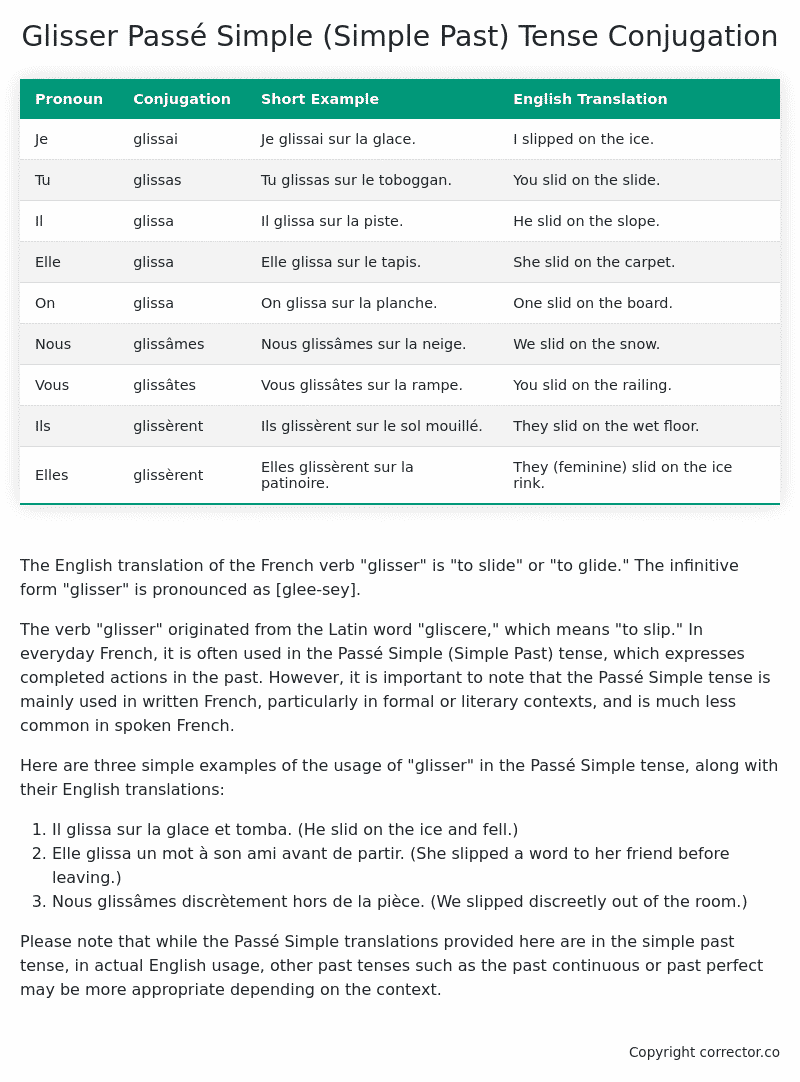Passé Simple (Simple Past) Tense Conjugation of the French Verb glisser
Introduction to the verb glisser
The English translation of the French verb “glisser” is “to slide” or “to glide.” The infinitive form “glisser” is pronounced as [glee-sey].
The verb “glisser” originated from the Latin word “gliscere,” which means “to slip.” In everyday French, it is often used in the Passé Simple (Simple Past) tense, which expresses completed actions in the past. However, it is important to note that the Passé Simple tense is mainly used in written French, particularly in formal or literary contexts, and is much less common in spoken French.
Here are three simple examples of the usage of “glisser” in the Passé Simple tense, along with their English translations:
- Il glissa sur la glace et tomba. (He slid on the ice and fell.)
- Elle glissa un mot à son ami avant de partir. (She slipped a word to her friend before leaving.)
- Nous glissâmes discrètement hors de la pièce. (We slipped discreetly out of the room.)
Please note that while the Passé Simple translations provided here are in the simple past tense, in actual English usage, other past tenses such as the past continuous or past perfect may be more appropriate depending on the context.
Table of the Passé Simple (Simple Past) Tense Conjugation of glisser
| Pronoun | Conjugation | Short Example | English Translation |
|---|---|---|---|
| Je | glissai | Je glissai sur la glace. | I slipped on the ice. |
| Tu | glissas | Tu glissas sur le toboggan. | You slid on the slide. |
| Il | glissa | Il glissa sur la piste. | He slid on the slope. |
| Elle | glissa | Elle glissa sur le tapis. | She slid on the carpet. |
| On | glissa | On glissa sur la planche. | One slid on the board. |
| Nous | glissâmes | Nous glissâmes sur la neige. | We slid on the snow. |
| Vous | glissâtes | Vous glissâtes sur la rampe. | You slid on the railing. |
| Ils | glissèrent | Ils glissèrent sur le sol mouillé. | They slid on the wet floor. |
| Elles | glissèrent | Elles glissèrent sur la patinoire. | They (feminine) slid on the ice rink. |
Other Conjugations for Glisser.
Le Present (Present Tense) Conjugation of the French Verb glisser
Imparfait (Imperfect) Tense Conjugation of the French Verb glisser
Passé Simple (Simple Past) Tense Conjugation of the French Verb glisser (You’re reading it right now!)
Passé Composé (Present Perfect) Tense Conjugation of the French Verb glisser
Futur Simple (Simple Future) Tense Conjugation of the French Verb glisser
Futur Proche (Near Future) Tense Conjugation of the French Verb glisser
Plus-que-parfait (Pluperfect) Tense Conjugation of the French Verb glisser
Passé Antérieur (Past Anterior) Tense Conjugation of the French Verb glisser
Futur Antérieur (Future Anterior) Tense Conjugation of the French Verb glisser
Subjonctif Présent (Subjunctive Present) Tense Conjugation of the French Verb glisser
Subjonctif Passé (Subjunctive Past) Tense Conjugation of the French Verb glisser
Subjonctif Imparfait (Subjunctive Imperfect) Tense Conjugation of the French Verb glisser
Subjonctif Plus-que-parfait (Subjunctive Pluperfect) Tense Conjugation of the French Verb glisser
Conditionnel Présent (Conditional Present) Tense Conjugation of the French Verb glisser
Conditionnel Passé (Conditional Past) Tense Conjugation of the French Verb glisser
Conditionnel Passé II (Conditional Past II) Tense Conjugation of the French Verb glisser
L’impératif Présent (Imperative Present) Tense Conjugation of the French Verb glisser
L’impératif Passé (Imperative Past) Tense Conjugation of the French Verb glisser
L’infinitif Présent (Infinitive Present) Tense Conjugation of the French Verb glisser
L’infinitif Passé (Infinitive Past) Tense Conjugation of the French Verb glisser
Le Participe Présent (Present Participle) Tense Conjugation of the French Verb glisser
Le Participe Passé (Past Participle) Tense Conjugation of the French Verb glisser
Struggling with French verbs or the language in general? Why not use our free French Grammar Checker – no registration required!
Get a FREE Download Study Sheet of this Conjugation 🔥
Simply right click the image below, click “save image” and get your free reference for the glisser Passé Simple tense conjugation!

Glisser – About the French Passé Simple (Simple Past) Tense
Formation
Usage
Narration
Historical Context
Interactions with other tenses
Passé Composé
Imparfait
Conditional and Subjunctive
Summary
I hope you enjoyed this article on the verb glisser. Still in a learning mood? Check out another TOTALLY random French verb conjugation!


